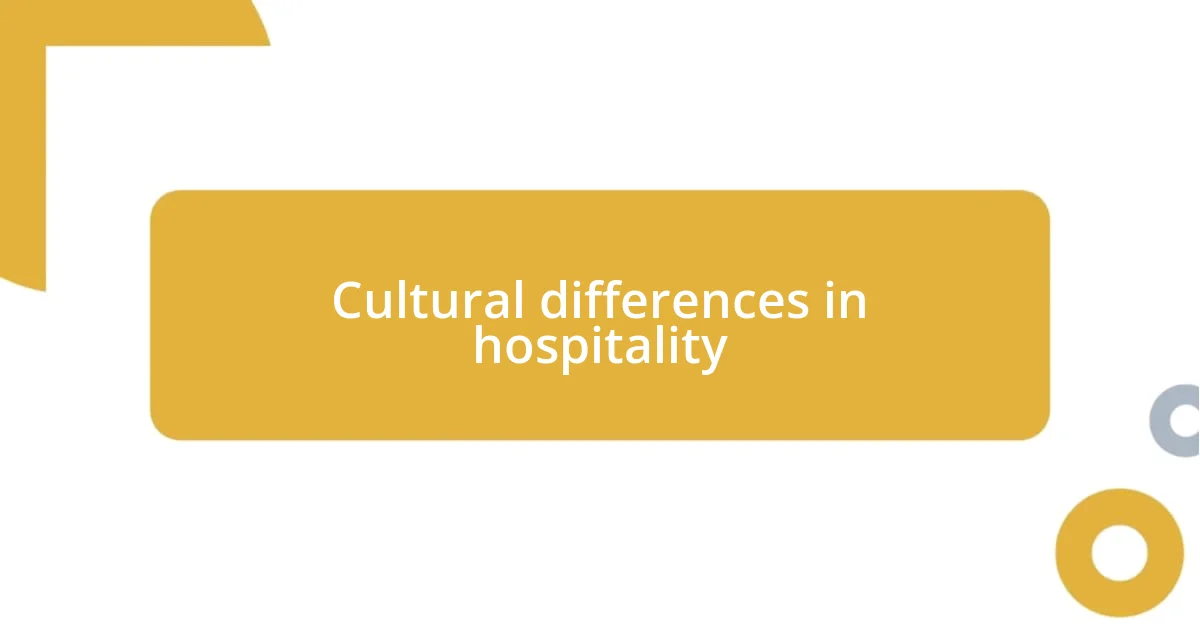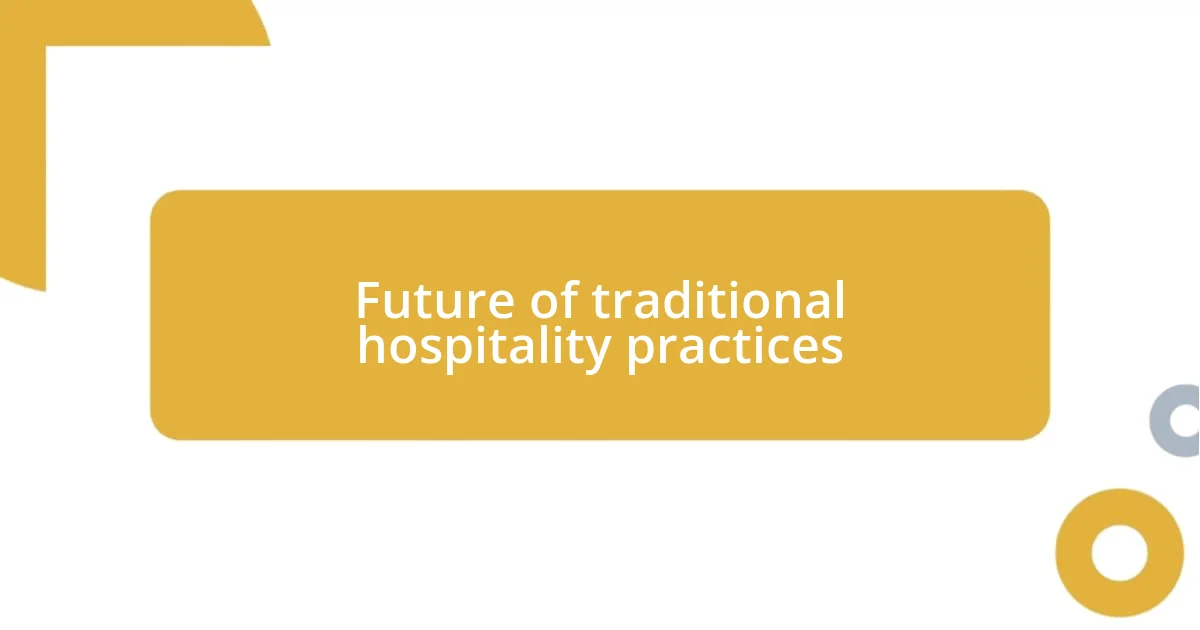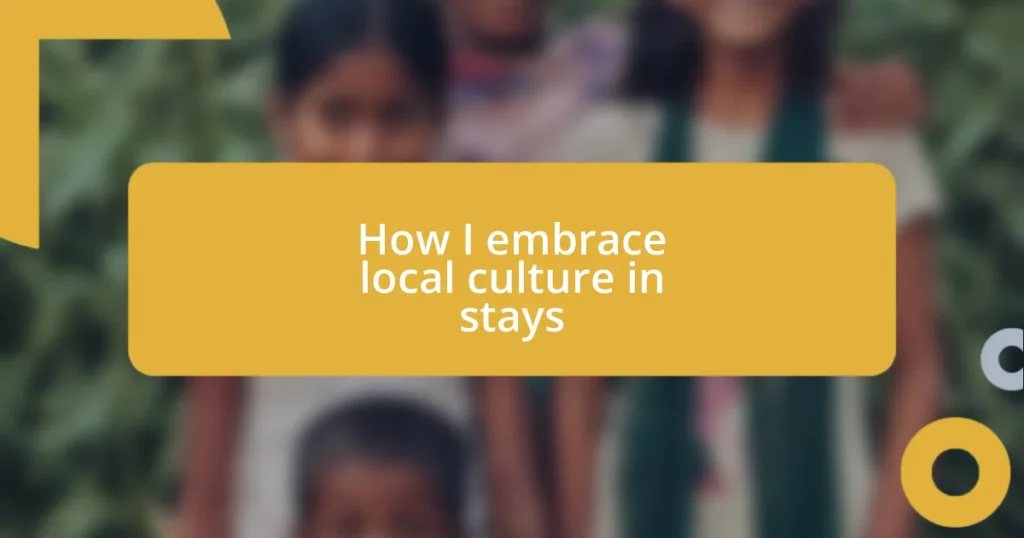Key takeaways:
- Traditional hospitality emphasizes genuine connections and empathy, creating memorable experiences through personal engagement and cultural reflection.
- Cultural differences shape hospitality practices, with unique approaches like Japan’s ‘omotenashi’ and the Mediterranean’s communal atmosphere offering valuable lessons in connection and community.
- The future of hospitality will blend tradition and technology, focusing on personalized services and sustainability while honoring local heritage and fostering community bonds.

Understanding traditional hospitality
Traditional hospitality is an art form that goes beyond mere service; it’s about fostering genuine connections. I remember dining at my grandmother’s house where the meal was always just as important as the warmth of her laughter. Isn’t it the little things, like a cozy setting and a heartfelt conversation, that truly make you feel welcome?
At its core, traditional hospitality is rooted in culture and history, often reflecting the values of the community. When I traveled to a small village, the villagers treated me like family, allowing me to immerse myself in their customs. It made me wonder, what if every interaction we had felt that personal and inviting?
The concept also involves a deep sense of empathy towards guests, enhancing their experience through attentiveness. I recall a time when a host noticed I wasn’t eating much and offered me a completely different dish, catered to my expectations. Isn’t it remarkable how hospitality can adapt to individual needs, creating an atmosphere where every guest feels seen and valued?

Core principles of traditional hospitality
The core principles of traditional hospitality revolve around the concept of empathy and attentiveness. It’s not just about providing food or shelter; it’s about truly connecting with guests. One winter, I attended a celebration in my friend’s home, where everyone was encouraged to share stories. The warmth from the fireplace felt like a physical embrace, reminding me just how critical the atmosphere is in making people feel at home.
Here are some essential principles to consider:
- Personal Connection: Engaging with guests on a personal level fosters trust and warmth.
- Cultural Reflection: Hospitality should highlight and celebrate local customs, enriching the experience for both hosts and guests.
- Empathetic Service: Tailoring experiences to individual needs ensures that guests feel acknowledged and valued.
- Generosity of Spirit: An open-hearted approach that prioritizes the comfort of others deepens the hospitality experience.
- Attentive Listening: Being present and receptive helps anticipate guest needs, allowing for a more seamless experience.

Cultural differences in hospitality
Cultural differences in hospitality can be fascinating and enlightening. For instance, during my stay in Japan, the concept of ‘omotenashi’ really struck me. This term encapsulates a level of hospitality that’s deeply ingrained in their culture, where hosts anticipate guests’ needs even before they express them. I felt this when a server noticed my uneasy gestures and promptly offered a warm cup of tea, all without a word spoken.
In contrast, my experiences in a Mediterranean country revealed a more casual approach to hospitality. The emphasis was placed on sharing food and stories rather than formalities. At a local taverna, I recall being invited to join a lively discussion with strangers around a communal table. It was all about laughter, the clinking of glasses, and an effortless sense of belonging—an entirely different yet equally inviting experience.
These cultural nuances reflect deeper societal values, showcasing how hospitality styles can vary significantly. Each approach teaches us something unique about connection and community. It’s clear that hospitality goes beyond just serving; it’s about creating memorable experiences that resonate long after the meal is over.
| Cultural Aspect | Japanese Hospitality (Omotenashi) |
|---|---|
| Mediterranean Hospitality | Warm, Casual Atmosphere |
| Focus on Anticipation | Emphasis on Sharing and Community |
| Formal Interactions | Informal, Engaging Conversations |

Personal experiences in traditional hospitality
During my travels in Mexico, I found myself in the midst of a vibrant family gathering that was nothing short of magical. I was overwhelmed by the abundance of food and the joy that filled the air. My heart swelled as I watched my host, a grandmotherly figure, insisting that I try just one more dish. Isn’t it amazing how food becomes a language of love in gatherings like these? That sense of community and warmth truly embodies the essence of traditional hospitality.
On a different occasion, I volunteered at a local charity event where people from all walks of life came together to support one another. The heartfelt exchanges and the genuine desire to uplift each other left a profound impact on me. I remember sharing a laugh with someone whose background was drastically different from mine, yet we found common ground over our favorite childhood snacks. Moments like these remind me that hospitality can bridge societal gaps and create bonds that transcend cultural differences.
I also recall the rainy evening I spent in a quaint bed and breakfast in Ireland. The hosts greeted me with open arms, offering a cozy blanket and a cup of steaming hot cocoa. As we chatted by the fire, I couldn’t help but think about how hospitality is often about making a stranger feel like family. It’s these small gestures—like a warm drink on a chilly night—that resonate and linger in one’s heart long after the moment has passed. Do you also feel that hospitality isn’t just about service, but about creating a sense of home wherever we go?

Lessons learned from hospitality practices
Hospitality has taught me that genuine connections can be made through simple, thoughtful gestures. I’ll never forget the time I was welcomed into a traditional Moroccan home. The warmth of the family engulfed me the moment I stepped inside. As we sat cross-legged on plush cushions, they served mint tea with such reverence. It became clear to me that the act of sharing tea was more than just a refreshment; it was about inviting someone into their world, creating a moment of intimacy that transcended language.
One valuable lesson I’ve learned is the importance of attentiveness. During my stay at a quaint hotel in the Scottish Highlands, the innkeeper seemed to know exactly when I needed assistance without me having to ask. I vividly remember stepping out into the brisk air only to find a delicious homemade biscuit waiting for me upon my return. This small gesture not only lifted my spirits but also highlighted how being attentive can elevate a guest’s experience, transforming it from ordinary to exceptional.
Reflecting on my experiences, it’s evident that hospitality is less about the grandeur of the setting and more about the warmth of the environment. I recall a small tea house tucked away in a busy Tokyo alley. The owner, an elderly gentleman, would take the time to share stories of his past with each visitor, making everyone feel valued. Isn’t it incredible how a simple story can turn a casual encounter into a lasting memory? These experiences remind me that genuine hospitality is a beautiful dance of care and connection that we can all partake in, regardless of the setting.

Applying traditional hospitality today
When I think about applying traditional hospitality today, I’m reminded of a small festival I attended in a coastal town. The locals opened their homes to visitors, offering not just food but also stories from their heritage. I recall being invited into a family kitchen where a mother was teaching her children how to make empanadas. The laughter, the flour flying, and the sweet aroma in the air created an atmosphere that felt warm and inviting. It made me realize how hospitality infused with tradition can foster connections across generations.
I also had a transformative experience at a community dinner in a local park. It was heartening to see people share not only a meal but also their unique culinary traditions, turning dinner into a vibrant tapestry of cultures. I struck up a conversation with an elderly man who had brought his grandmother’s recipe for pastries. As he passionately described each ingredient, I couldn’t help but marvel at how food is truly a vehicle for shared memory. Have you ever thought about how sharing recipes can create a sense of belonging, regardless of our different backgrounds?
In my own home, I’ve started to embrace these lessons of traditional hospitality. By incorporating family recipes into my gatherings, the meals become more than just food; they turn into cherished traditions that spark conversations. I make it a point to greet guests at the door with an energetic smile and a warm drink, reflecting what I’ve learned along my journey. Isn’t it fascinating how small acts, like inviting someone into your culinary world, can make them feel instantly at home?

Future of traditional hospitality practices
The future of traditional hospitality practices is likely to evolve while still holding onto the core values of connection and warmth. I envision a blend of technology and tradition, where meaningful guest experiences are enhanced by personalized services powered by data. For instance, imagine arriving at a hotel, and upon check-in, the staff already knows your preference for a specific type of tea or pillow. Doesn’t that idea resonate with the personal touch we often cherish in traditional hospitality?
As I reflect on my experiences, I believe cultural heritage will play a significant role in shaping future practices. Many establishments are beginning to honor their roots by incorporating local traditions into their services. For example, I once visited a new restaurant that not only served regional dishes but also hosted workshops on traditional cooking techniques, inviting guests to be part of the local narrative. Doesn’t this approach create a deeper bond between the guests and the community?
I am particularly excited about the growing emphasis on sustainability within traditional hospitality. From using locally sourced ingredients to promoting eco-friendly practices, hotels and restaurants are now more attuned to their impact on the environment. I remember dining at a farm-to-table restaurant, where the chef shared stories of the local farmers who supplied the ingredients. It wasn’t just about the meal; it was about supporting a community and honoring the land. How can we not feel a sense of connection when we know the backstory of what we consume? This perspective will undoubtedly guide the future of hospitality, marrying generosity with responsibility.















